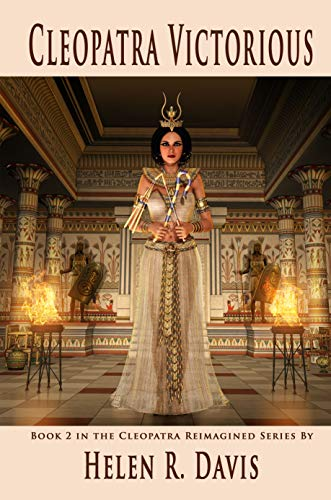I had the opportunity this week to read two delightful alternative history novels, Cleopatra Unconquered and Cleopatra Victorious by Helen R. Davis.
~.~
Cleopatra Unconquered
I adore a well-researched novel and this one satisfied my cravings. Though technically an "alternative history" there's enough real history here to satisfy even the most discerning of history buffs, and even the "unreal" characters like Isis and Athena are painted realistically.
We see Cleopatra's youth and
traumas through the eyes of Isis, who has taken a special interest in baby
Cleopatra. Cleopatra returns this devotion as she grows. (She's a Greek by
bloodline, but in her faith and traditions, Cleopatra is fully Egyptian.) Isis
protects her where she can and tries to guide her to making the choices that
will help fulfil a destiny worthy of her.
Cleopatra herself takes over the
narration at points and we see how difficult it was for her to navigate some of
the challenges she faced, such as the betrayals of her siblings and her quiet
disappointment in her father's indolence and alcoholism. Taking the throne is
her means of survival, but she also loves Egypt and wants it to thrive. That's
why turning to Caesar is the natural choice.
She comes to love this soldier with
rough edges, though it will one day be Mark Antony who makes her heart truly sing.
But Caesar, despite being ruler of much of the known world at the time, fails
her in crucial ways.
We see twists of fate, both small
and large, that changed the course of history. The author deftly turns a few of
these to give Cleopatra and Antony victory at a crucial moment, opening a huge
range of possibilities.
I liked the character of Cleopatra
in this novel. I've read fictionalized versions of her life where she comes off
a stilted and cold. This Cleopatra loves and worries and has flaws, but wants
to do the right thing. She's a woman of faith and ambition, smart as a whip and
curious about the world around her. She sees the value of diplomacy over
warfare, conquering hearts and minds to outwit her enemies.
It will be interesting to see in
the next volume how Cleopatra shapes the modern world.
Cleopatra Victorious
What if Cleopatra and Mark Antony had shaped the pre-modern world?
It's a fascinating question to ponder, and this novel does it well.
In the previous book, Cleopatra and Antony won the Battle of Actium and Octavian was killed. Cleopatra and Antony now control a vast territory: Egypt in the East and Rome's dominions in the west. Their children, Alexander Helios and Cleopatra Selene -- as well as Cleopatra's son by Caesar -- thrive and have magnificent destinies of their own to find.
Would Cleopatra and Antony have been able to keep together the empire? Would Rome have accepted another Imperator, or recognized Caesar's son? Could Cleopatra have won them over and been able to establish herself as a legitimate wife or would Caesar's enemies have triumphed in continuing to paint her as a vile temptress? What if Antony and Cleopatra had managed to use the marriages of their children to create bonds between kingdoms? The book delves into all of the struggles the couple would have faced in strengthening and even expanding their holdings.
As with the first book, the goddesses who protect Cleopatra are depicted as characters with motivations and desires of their own. Caesar joins them in the Vault of Nut and is able to watch the world that they're creating.
As Cleopatra ages, the faith that sustained her never wavers. But she does begin to worry about her soul. What if the sins of battling against her brothers and sisters have weighed down her heart too much to survive judgment?
She also deals with the same family struggles that will be familiar to modern parents when one of her children acts out and seemingly rejects all of the values she's tried to instill in him.
She lives long enough to watch the world around her changing, such as the rise of a new Messianic religion in Judea, something that piques her life-long curiosity. The region fascinates her, despite her enmity with Herod.
Carefully, she and Antony build and strengthen. He, of course, is more attuned to war and conquest while she prefers to fight diplomatic battles and use the marriages of her children to create bonds. Toward the end of the novel, we see how she's positioned all of the chess pieces to leave a magnificent inheritance to her children, ruling over vast kingdoms... if they'd be able to hold onto it.
As I mentioned in my review of the first volume, I love a well-researched novel, and though this is alternative history, the real history is depicted with care. A history buff will recognize the real details carefully woven into the narrative. (There was even a small bit of the Apocrypha stirred in!) What could Antony and Cleopatra have built if there'd been just a few different turns of fate?



No comments:
Post a Comment
Thank you for your comment. It will be added after the administrator screens for spam.